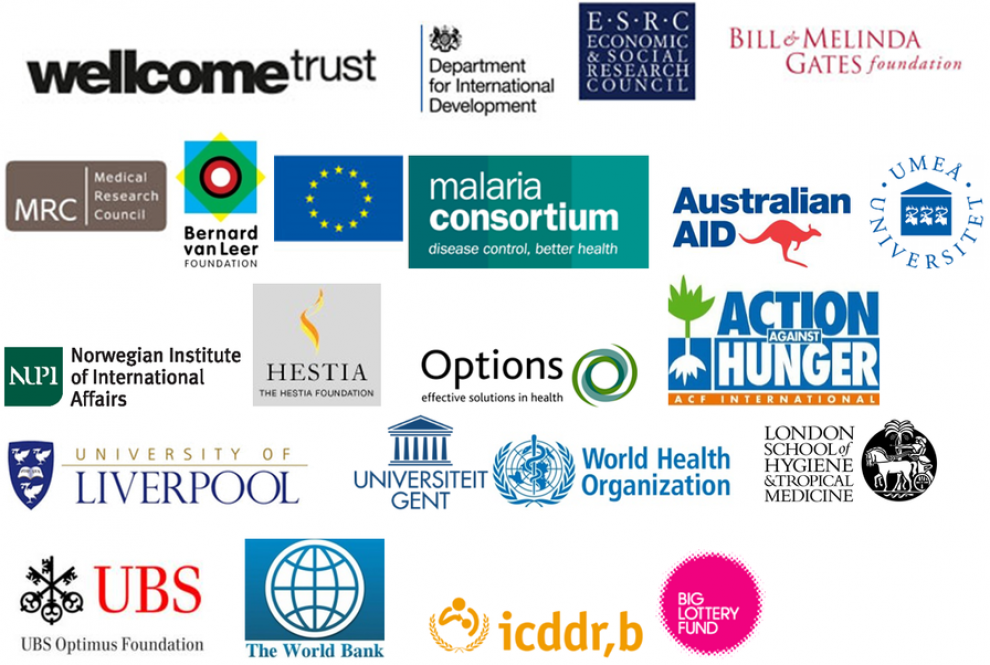The Institute for Global Health works in partnership with international agencies, NGOs, Ministries of Health, educational institutions, the UK NHS and enterprise to improve health.
Global Health at UCL
Our Institute forms part of a wider community of departments and teams working on Global Health at UCL. This community helps us to foster close links and work on common goals with our colleagues at the Grand Challenge of Global Health, the Global Engagement office and the Africa Health Research Institute (AHRI). Read more on the Global Health at UCL website.
International Research Partnerships:

Country specific partnerships
- Bangladesh
Bangladesh Diabetic Association- Perinatal Care Project
The Perinatal Care Project (PCP) was established in 2002, as a joint collaborative project between the Diabetic Association of Bangladesh (BADAS), Women and Children First (UK) and the UCL Centre for International Health and Development (UK)and is sponsored by the Big Lottery Fund. This project also funded by Welcome Trust from 2009.
- India
Futures Group
Futures Group, the global health consulting firm, works in close partnership with global and local leaders and communities to protect and promote people's health and well-being so they can transform their own lives and their futures.Ekjut
Ekjut will work in the districts in India for the improvement of maternal, newborn, child health and nutrition of partnering underserved, marginalised communities, through their empowerment, community based interventions and influence good governance for improving access and quality of services. This will be done through collaborating with leading agencies for building our research capacities to strengthen evidence base, dissemination of findings, engagement with government and networks and supporting scaling up of effective interventions.SNEHA
SNEHA is a secular, Mumbai-based, non-profit organisation which believes that investing in women's health is essential to building viable urban communities. SNEHA targets four large public health areas - Maternal and Newborn Health, Child Health and Nutrition, Sexual and Reproductive Health and Prevention of Violence against Women and Children.Its approach is two pronged: It recognises that in order to improve urban health standards, its initiatives must target both care seekers and care providers. It works at the community level to empower women and slum communities to be catalysts of change in their own right and collaborate with existing public health systems and health care providers to create sustainable improvements in urban health.
CREA
CREA is a feminist human rights organisation based in New Delhi, India. It is one of the few international women's rights organisations based in the global South, led by Southern feminists, which works at the grassroots, national, regional, and international levels. Together with partners from a diverse range of human rights movements and networks, CREA works to advance the rights of women and girls, and the sexual and reproductive freedoms of all people. CREA advocates for positive social change through national and international fora, and provides training and learning opportunities to global activists and leaders through its Institutes.Public Health Foundation of India
The Public Health Foundation of India (PHFI) is a public private initiative that has collaboratively evolved through consultations with multiple constituencies including Indian and international academia, state and central governments, multi & bi-lateral agencies and civil society groups. PHFI is a response to redress the limited institutional capacity in India for strengthening training, research and policy development in the area of Public Health.
- Nepal
CREHPA
Center for Research on Environment Health and Population Activities (CREHPA) is a private, not-for-profit consultancy and research organisation based at Kathmandu, Nepal. It is registered under Society's Act 2034, HMG as a non -governmental organisation (NGO). It is also registered with the Social Welfare Council (SWC), Nepal.Established in July 1994, most of the founder members of CREHPA and professional staff have many years of research experiences in the field of public health, population and reproductive health, Gender and development (GAD), environment, community development, market research, and management studies. The core researchers of CREHPA have acquired research capacity development trainings from different international and regional professional trainers and institutions.
MIRA
Mother and Infant Research Activities (MIRA) was established in 1992 to conduct studies and develop appropriate and cost-effective interventions to improve maternal and infant health in the country. It was formally registered as a non- government organisation with the office of the Chief District Officer, Kathmandu in 1994. MIRA is run by a group of experienced and committed Nepalese health and development professionals and has conducted several studies to look at important causes of perinatal and neonatal problems in the country. Studies include topics such as perinatal nutrition and asphyxia, value of multiple micronutrient supplementation in pregnant women and babies, and testing a participatory intervention to reduce neonatal and maternal mortality through womens' groups. MIRA works closely with the government sector, and was involved in the development of the National Neonatal Health Strategy of the Ministry of Health for improving the care of newborns at each level of care.HERD
Health Research and Social Development Forum (HERD) is a national organisation working in Nepal, established in 2004 to promote evidence informed policies and practices for sustainable development to improve quality of life. Our working modality functions with the 3I approaches of: Intervention, Innovation and Impact.In line with our organisational vision and mission, HERD conducts a broad scope of activities: research, monitoring and evaluation, programme implementation, policy development, service delivery, social development, research dissemination and communications. We work cross sectorally and have led initiatives in the areas of Health, Education, Nutrition, Governance Strengthening and Policy Development, Crisis Response, Migration, Water Sanitation and Hygiene, Media and Social Development.
HERD works closely with stakeholders at local, regional, national and international level. Our projects involve the Government of Nepal; Development Partners - bilateral, multilateral agencies and civil society organizations; academic institutions; the private sector; and service delivery centres such as health facilities, schools, engineering institutions based. HERD also operates through its collaborative partner - HERD International, a national consulting firm established in 2014.
 Close
Close

